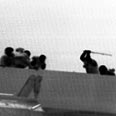
Preparing for flotillas like on eve of war
IDF examining ways of improving non-violent siege-enforcement methods ahead of next aid sails to Gaza while political rank holds frequent status evaluation meetings, which some say are unnecessary
Current Israeli preparations ahead of the arrival of the Lebanese and Iranian provocation flotillas are reminiscent of war preparations.
The Israel Defense Forces and political rank are engaged in the drawing of lessons from the previous Navy raid. Still, the commissions of inquiry appointed by the IDF chief of staff and the prime minister have yet to complete their reports and the state comptroller has yet to even commence his investigation.
Behind this surge of activity, is the prime minister and ministers' understanding that they were overly complacent during preparations for the previous Turkish flotilla. This led to impairments in the government's decision-making process.
In order to prevent similar mistakes, Prime Minister Benjamin Netanyahu has been frequently convening the Security Cabinet, consulting his colleagues and reaching decisions pertaining to various aspects of treatment of the next flotillas, over the last few weeks. The Security Cabinet is the body appointed by the government to handle security issues on its behalf. The forum of seven top ministers, which has no leagal standing, in comparison, is rarely convened by Netanyahu.
The National Security Council appears to be more involved this time around in preparing materials regarding the next convoys for the political rank. In addition, the governmental PR outline has stepped in and is issuing materials meant to support Israeli hasbara in relation to methods employed by the State to stop future aid flotillas.
The IDF is currently focusing on two main aspects. One, is correcting serious impairments which were found in intelligence collection and evaluation prior to the previous raid. The army is examining ways to increase cooperation and coordination between various IDF intelligence bodies.
The other aspect is improving the IDF's abilities to enforce the siege using non-violent methods.
Status evaluation meetings
Defense Minister Ehud Barak is also drawing personal lessons. He convened a number of evaluation meetings prior to his trip to the United States last week and presented their conclusions to the Security Cabinet. Industry, Trade and Labor Minister Binyamin Ben-Eliezer, who is replacing Barak during his absence, also convened status evaluation meetings in order to monitor the next flotillas and preparations to stop them.
The Foreign Ministry and Minister Avigdor Lieberman are also far more involved this time around in political and diplomatic efforts to prevent the Lebanese sail. Previously, such efforts were conducted almost exclusively by Barak.
Some elements in the defense system and governmental rank claim that the intensity of preparations is exaggerated and more driven by the attempt of the parties involved to fend off future pubic criticism and less by the will to improve the decision-making process.










